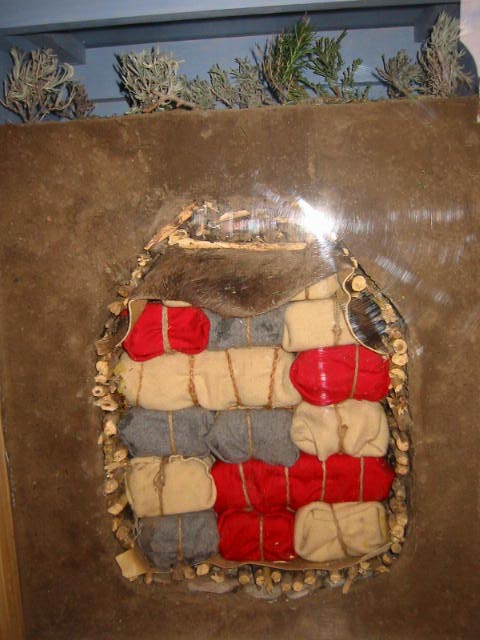The CACHE
(pronounced "cash")


For centuries, mankind has felt the need to hide things of value, often by burial. A very early example is the Biblical parable of the talents (a coin of the day) as told in Matthew 24:18. The mountain men were no different and many journal references describe how they buried their goods into what is called a cache.
The word 'cache' (noun or verb) comes from the French word cacher meaning to conceal or to hide. Webster's 1913 dictionary defines cache as: "a hole in the ground, or hiding place, for concealing and preserving provisions which is inconvenient to carry."
The mountain man, whether an explorer, a trader, or a trapper, cached goods for several reasons. The explorer could lighten his load for a difficult part of his journey, or cache important items (such as food, lead and gunpowder) for his return trip. The trader could store some of his trade goods for later retrieval. The trapper needed a place to hide his beaver pelts until he was ready to transport them to the markets back east.
Just about every type of item a mountain man ever used was hidden inside a cache. An incomplete listing would include: beaver (or other) pelts, traps, guns, gunpowder, flints, lead bars, tobacco, knives, axes, coffee, sugar, salt, ham, pork, beans, corn, buffalo robes, blankets, saddles, cloth, beads, Indian trinkets and much more.
A successful cache had to be built in secrecy, in a safe location, and with the utmost care to avoid leaving even the smallest bit of evidence. Some caches did not succeed. One of the most common reasons was flooding. In the early 1800's there were no highways, only rivers provided main travel routes. Caches built on or near riverbanks were sometimes ruined by rising waters. Another reason, at least where food was not well concealed, was a raid by the local critters. There's no better nose for food than a coyote, who happens to be a pretty good digger. Some caches were lost to thieves if they were not well guarded during construction or if evidence was carelessly left behind. There may still be some caches out there today waiting to be rediscovered if the original owners hid them so well they couldn't find them again!